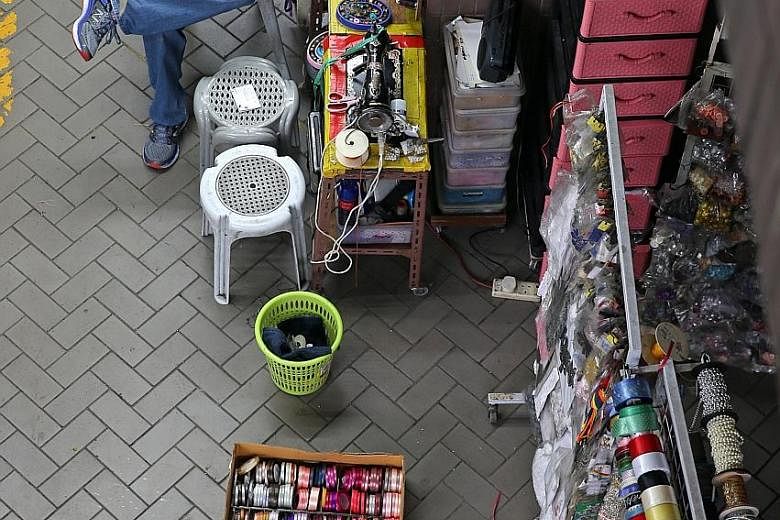Working in old age evokes two opposing images. One is of vulnerability and need, of elderly people who make a living clearing tables at hawker centres and collecting cardboard. Then there is the image of productivity, active ageing and choice, of older people who continue to work because it gives meaning and a sense of independence.
So which image better depicts the experiences of older workers?
This question has gained increasing interest as population ageing prompts measures to retain older workers, but the public remains concerned about the work conditions some elderly workers face. Ongoing debates in the news and social media disagree on the motivations of work in old age.
In a recent report, several elderly persons who were interviewed said they were working to stay physically and mentally active rather than to meet their expenses ("Age of golden workers: Many seniors working into 80s and 90s to stay active"; ST, April 30).
However the report also quotes a Member of Parliament who observed that elderly workers do not always admit that they need the income. Some even avoid seeking help because they prefer to depend on themselves.
There are reasons to be upbeat about the future. In the long run, due to better educational and economic opportunities, there will be fewer people in physically demanding manual jobs from which workers normally have to retire earlier.
Greater income accumulation in the younger years will mean that more people can make a choice about work in their later years. Central Provident Fund (CPF) coverage and account balances have been rising steadily.
However the elderly population, like all other age groups, is diverse.

When the National Survey of Senior Citizens asked elderly people in 2011 why they continued to work, more than half said that it was to meet their current living expenses.
Another 20 per cent cited concerns about long-term income security. Just 12 per cent chose to work in order to stay active, while 7 per cent were looking to occupy their time. Quite clearly, many did not consider retirement an option.
To understand this, one must consider whether elderly people's income situations allow them to make a genuine choice about employment. Despite improvement over the years, the elderly population still has fairly low incomes. The 2011 survey found that one in four elderly persons had a monthly income of $500 or less, taking into account not just income from work but all possible sources such as the CPF, family and public assistance.
It is sometimes suggested that elderly people do not need active income sources because they own assets - especially housing - that can be converted into equity when necessary, or that they may turn to their family in times of need.
But elderly people who are poorest in terms of income are also least likely to own housing. Currently almost 25,000 elderly people live in public rental housing. These tenants have no housing asset set aside for a rainy day.
Demographic trends indicate that, in future, older people will have fewer working-age children to rely on for financial support. This is worrying as adult children have traditionally been the most important source of income in old age. Already, co-residence with adult children, which helps to defray elderly parents' costs of living, is falling rapidly.
Policy developments in the last few years show that policymakers are keenly aware of these issues. A new Silver Support Scheme was recently introduced to provide up to $100 a month to elderly persons with low lifetime CPF contributions. There has been periodic tinkering around the edges of the CPF. The reach of public assistance under the ComCare programme has widened considerably. Under the terms of short- to medium-term assistance, elderly applicants are required to continue looking for work - there is no question of choice here.
Even when they are in the workforce, elderly workers cannot take economic security for granted as they tend to earn much less than younger workers.
Last year, the median monthly work income of persons aged 60 and above was $2,000, compared with $3,500 among the general population. About 13,500 of these older workers earned less than $500 per month. Measures such as the Workfare Income Supplement (WIS) Scheme and the Progressive Wage Model provide critical starting points for addressing this problem.
Lower work incomes reflect the work conditions that elderly people experience. Figures from the Ministry of Manpower show that older workers are three times as likely as the average worker to hold low-paying service jobs such as cleaning, and twice as likely to work part-time and on term contracts.
Work for many older people is more insecure and less rewarding than for younger people.
In fact, as work continues to become more flexible and less secure across the economy, even younger workers will be affected, especially those who are less educated. Part-time and contract work had risen in the past when economic conditions tightened.
In the end, it is a mixed picture.
Some elderly people regard work as a source of social connectedness and personal fulfilment.
For many others, basic financial security is uncertain and staying employed is likely to be non-negotiable.
Much remains to be done so that more elderly people can make a meaningful choice about work.
•The writer is assistant professor at Lee Kuan Yew School of Public Policy, National University of Singapore.

